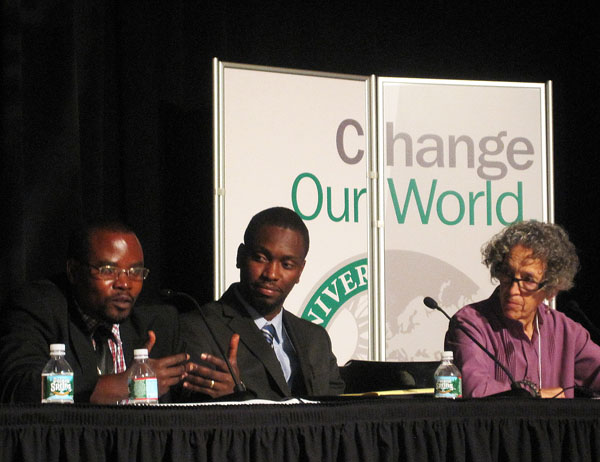
This past weekend, the Raise Hope for Congo campaign team attended an international summit hosted at Clark University in Worcester, Massachusetts, focused on the crisis in Congo, and how activists and academics can bring about change. The summit, aptly titled “Informed Activism: Armed Conflict, Scarce Resources, and Congo,” attracted close to 400 people, with participants representing students from 39 universities, 17 NGOs, Congolese civil society, media outlets, and the U.S. government.
The two-day conference aimed at identifying themes associated with the conflict in Congo, particularly the trade of conflict minerals, and then determining areas where U.S. activism can have the greatest impact. The program opened with a keynote address from Chouchou Namegabe, co-founder of the South Kivu Women’s Media Association that trains women to be journalists, with an emphasis on covering the prevalence of sexual violence, an issue that is highly stigmatized and unreported on in Congo despite the prevalence of gender-based violence in the eastern provinces. Namegabe called on summit participants to address the key drivers of the conflict that lead to the rape of so many Congolese women.
The central question and prevailing theme of the conference was, how can our activism here in the U.S. have a positive impact on the ground? The importance of student activism was a focus of many panel discussions and breakout sessions.
In sync with this message, Clark University President David Angel announced that Clark will issue a statement committing the university to favor electronics companies making significant steps toward producing conflict-free products—a direct result of the Conflict-Free Campus Initiative campaign led by STAND students. Clark’s conflict-free statement, which was preceded by five other similar statements issued by universities across the United States, sends a strong message to electronics companies with university contracts about the need for corporate responsibility.
Students from these five other universities also attended the conference, along with students from over 60 schools across the country who are working on conflict-free minerals campaigns on their campuses. In his speech announcing Clark’s commitment toward contributing to the movement for peace in Congo, President Angel referenced Clark’s motto: “Challenge Convention, Change our World,” which accurately reflects the goal of the weekend: to determine how U.S. citizens, consumers, and human rights activists can make a difference in a conflict that feels so far removed from our daily lives. To that point, we can make a difference by recognizing our connection to the conflict through our consumer electronics products.
Photo: Enough researcher Fidel Bafilemba addresses the Clark University summit alongside Friends of the Congo's Kambale Musavuli and American Jewish World Service's Ruth Messinger (Enough)

